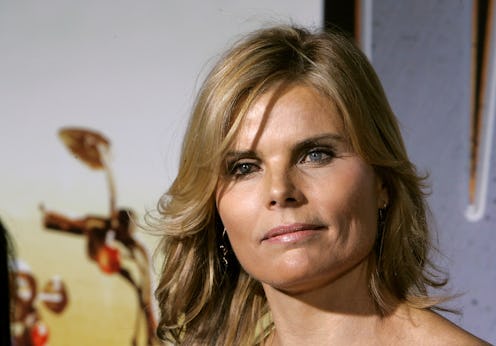Entertainment
These New Claims Against Woody Allen Are Sickening
This is sickening. In new claims against the 79-year-old filmmaker and actor, Mariel Hemingway said Woody Allen attempted to seduce her during the production of Manhattan back in 1979, when she was just 16 years old, and he was 44 years old. The actress shared her account of Allen's actions in her upcoming memoir, Out Came The Sun, which is due out on April 7.
Hemingway, whose role as the high school girl who falls in love with an older man (Allen), says in her book that Allen attempted to pursue a romantic relationship with her after they finished filming Manhattanby inviting her on a trip to Paris. It's unfortunately not surprising that Allen made advances on Hemingway — who, again, was only 16 years old in Manhattan — in light of the allegations of sexual abuse bravely brought against him by his adoptive Dylan Farrow in 2014. Hemingway's story is a sharp reminder that despite these accusations, Allen's career has remained intact. Can we all agree that now it's time to stop making excuses for him for the sake of his "art"?
In her memoir, Hemingway recalls that Allen visited her parents' home in Idaho to invite her to Paris, and there was confusion about the sleeping arrangements, to say the least — but her parents continued to encourage her to go. From Fox News, who obtained an exclusive excerpt from the book:
Our relationship was platonic, but I started to see that he had a kind of crush on me, though I dismissed it as the kind of thing that seemed to happen any time middle-aged men got around young women. I didn’t know what the arrangement was going to be, that I wasn’t sure if I was even going to have my own room. Woody hadn’t said that. He hadn’t even hinted it. But I wanted [my parents] to put their foot down. They didn’t. They kept lightly encouraging me.
Hemingway went on to say that eventually she went to Allen's room and simply asked him, "I'm not going to get my own room in Paris, am I?" After that, he left her parents' home the next morning. Hemingway's passage is entirely indicative of perhaps exactly why Allen is still successful — she excused his behavior as something that just seems to "happen." It's an echo of a greater problem, where women are discouraged from reporting abuse because they are so often made to believe it is their fault.
But even though Hemingway is not accusing Allen of any sexual misconduct — and in fact goes on to say that the two remained friends — the situation still strikes as alarming. Hemingway also talks about kissing Allen during the filming of Manhattan: it was her first real kiss, ever, and she said even though she was extremely nervous, he "attacked her like a linebacker." That at the very least is unsettling, and at the most is predatory. And more than a year after Dylan Farrow made the allegations against Allen, his career has been for the most part untouched. He blamed Mia Farrow for the incident, and he is the one with a new series coming up.
Will Hemingway's relation of this salacious encounter with Allen open up the conversation again about his abuse of Dylan Farrow? The defenders of Allen always framed their defense against art, saying he is a great filmmaker, and supporting his work does not make you a supporter of the man himself. Which, personally, I wholly disagree with, but I do have to concede that it is difficult to draw the line between the artist and the art.
But maybe Hemingway's story will make people see that the same man that was creating a story on-screen was participating in his own less noble narrative behind the scenes.
Image: Getty Images
